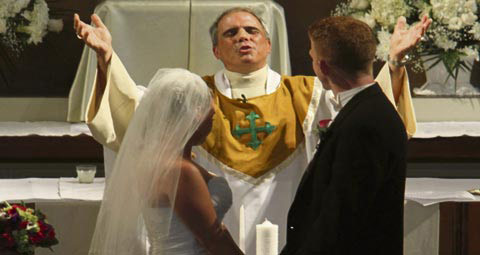July 13 | ![]() 0 COMMENTS
0 COMMENTS ![]() print
print

Changing the definition of marriage will forever alter our society
This week's editorial
The Scottish bishops’ call for parishioners to financially support a legal challenge to the Scottish Government’s push for same-sex ‘marriage’ is, rightly or wrongly, both a necessary development and a sad sign of the times.
Necessary because, in spite of recent delays over the result of the Scottish consultation on redefining marriage (which is believed to have registered overwhelming opposition to allowing same-sex ‘marriage’), it seems the Scottish Government will push ahead with its bid to alter this cornerstone of our society. While the time for diplomacy has not yet past, the time for action is here.
Sad because a Marriage Sunday fundraising drive by the Church in Scotland, planned for August 26, is a sign of how well-funded and mobilised those who seek to change the institution of marriage are and how dangerously close our society is to legitimising their goals.
Pope Benedict XVI expressed his fears over the secular agenda to politicians during his visit to the UK in 2010. “I cannot but voice my concern at the increasing marginalisation of religion, particularly of Christianity,” the Holy Father said at Westminster Hall. “There are those who would advocate that the voice of religion be silenced, or at least relegated to the purely private sphere.”
Legal guarantees to preserve Christian marriage do not hold up. Even if they did, the bigger picture remains that our society is about to sacrifice everything we hold dear and know to be true about the ideals of marriage and family on the altar of so-called ‘equality.’ Make no mistake, changing the definition of marriage will forever alter our society.
True, there are many evils in our world—including poverty and famine—which cry out for our financial aid, but sometimes charity begins at home. Support Marriage Sunday is one of those times.
Following reports on falling numbers of arrests at Orange marches in Scotland last weekend ahead of July 12, the SCO was asked this week: “How can an anti-Catholic parade only have a small number of arrests, surely all involved are breaching new hate crime laws?”
Clearly tensions run high on the issue.
Strathclyde Police report that five of those arrested last Saturday during Orange marches were charged with sectarian aggravation, down one from 2011.
And for anyone dismissing marching season as a West of Scotland problem, Central Scotland Police reported of the three arrests in Stirling on Saturday connected with Orange marches, one of those arrested faced sectarian breach of the peace charges.
The question has to be asked why this continues to play out in Scotland? And while no immediate connection has been made to the vandalism at St Conval’s Pollok, Glasgow, on Saturday, it does not look good now does it?











